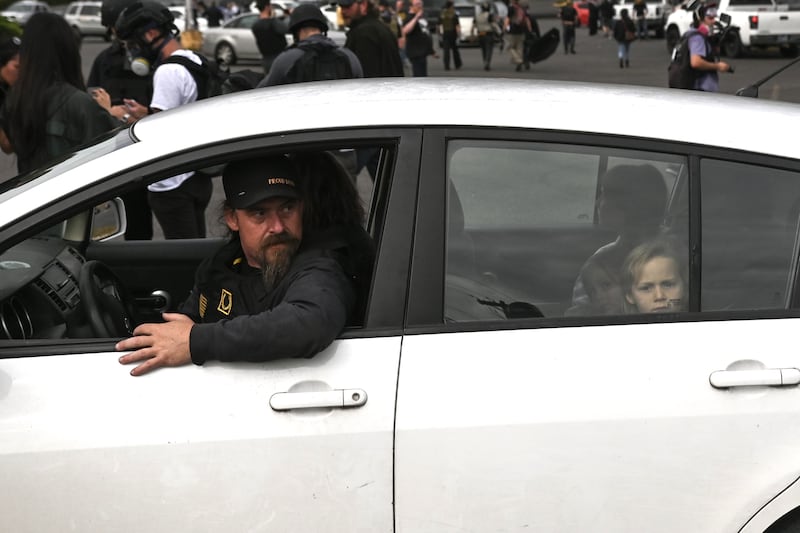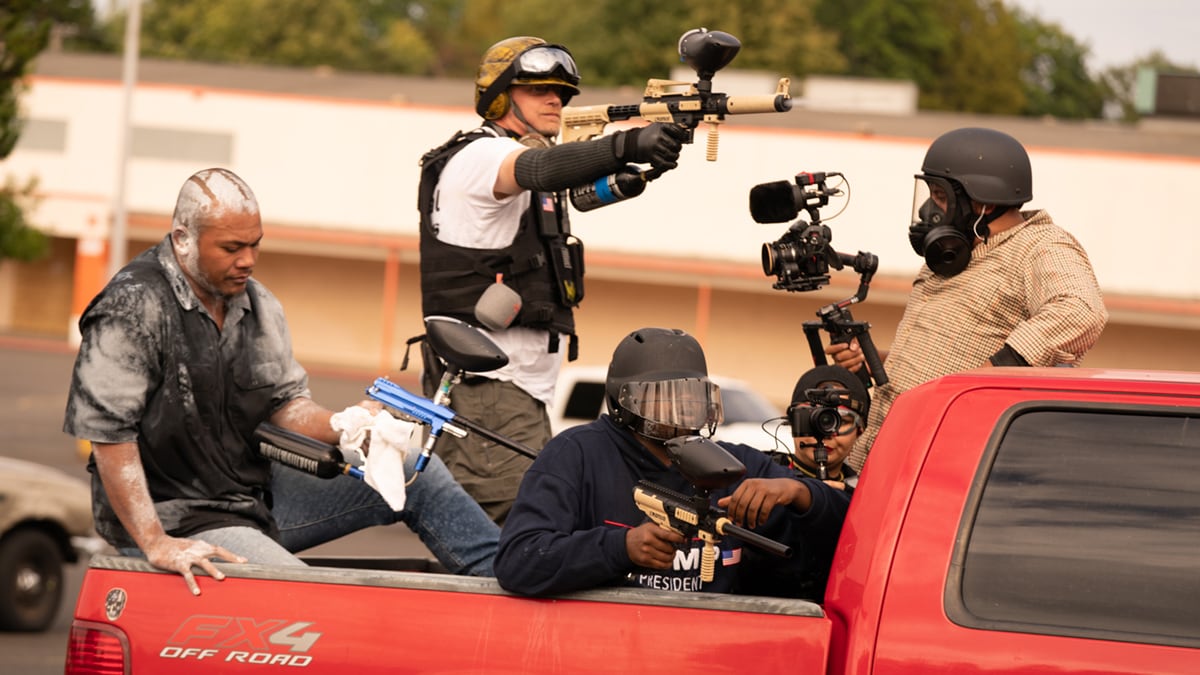Kaysen Kerrick was working Aug. 22 at a Chevron ExtraMile convenience store on Northeast 122nd Avenue. Around 4 pm, she saw men dressed in military-style clothing and “black bloc” garb run into the gas station’s parking lot, armed with what were most likely paintball guns.
Then came the fireworks. “It was bad, especially when they came and were throwing the fireworks, especially right there by the pumps,” Kerrick tells WW. “If any of the sparks from the fireworks hit it, everyone could’ve been gone in a flash.”
Kerrick says her co-worker called 911. The emergency operator’s response, she says: Stay inside the store and you will be OK. (The city’s Bureau of Emergency Communications, which fields 911 calls, confirmed to WW after press deadline that it received the call from Chevron.)
Kerrick and her colleagues did the opposite. Fearing for their safety if not their lives, Kerrick says, she and her colleagues locked up shop nearly six hours before the usual 10 pm closing time. “I didn’t want to stay and get hurt,” she says.
Kerrick was one of several Portlanders who inadvertently found themselves with a front-row seat to a mace-laden street brawl between ideological foes. A wall of trees and shrubbery separates the Chevron station from the parking lot of a shuttered Kmart, where Proud Boys and other extreme right-wing groups hosted a rally—and charged into the street when confronted by anti-fascists.
Portland police allowed the battle to happen. Two days before, Chief Chuck Lovell warned that the Portland Police Bureau would not intervene and would instead observe from a distance and only step in if a “life safety” event arose.
The result: a melee that spilled onto 122nd Avenue, to neighboring businesses, and into the parking lot of Parkrose High School.
On Aug. 23, the day after the rally, Mayor Ted Wheeler praised the city’s response, saying the hands-off tactics relegated the violence to those who chose to partake in it.
“With strategic planning and oversight, the Portland Police Bureau and I mitigated confrontation between the two events and minimized the impact of the weekend’s events to Portlanders,” said Wheeler, who serves as the city’s police commissioner. “Violence was contained to the groups of people who chose to engage in violence toward each other. The community at large was not harmed, and the broader public was protected. Property damage was minimal.”
Interviews with eight people who work or live along 122nd Avenue paint a different picture. They described feeling like police had surrendered their street—a main artery that connects some of Portland’s most racially diverse neighborhoods—to packs of costumed, weapon-toting extremists.
“It was lawless,” says Randy Blazak, an expert on extremism who chairs the Oregon Coalition Against Hate Crime. “There is a palpable fear among many people in the minority community that right-wing aggressors are allowed to roam freely in the city of Portland. By letting these groups go at it, you’re actually helping the Proud Boys and the extreme right wing because you’re giving them exactly what they want.”
Kerrick is more concise. “It’s not fun,” she says of what she witnessed. “It’s dangerous.”
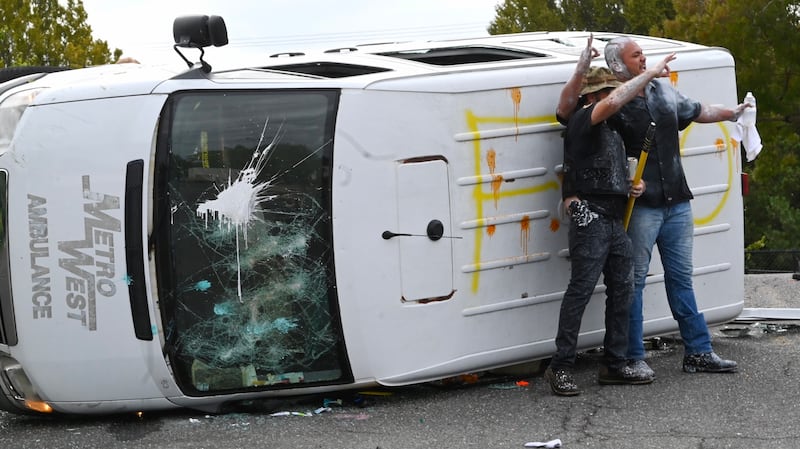
On Monday afternoon, several gawkers pulled into the parking lot to get a closer look at what had become something of a roadside attraction: a white van that was overturned Sunday by right-wing protesters in the Kmart parking lot, its dusty, oil-stained undercarriage exposed to passersby.
An employee with Graffiti Removal Services, which has a $679,692 contract with the city, circled the toppled van and assessed the paint splattered across the massive lot.
Juliette Muracchioli, the city’s graffiti program coordinator, confirms the city sent the contractor Monday to clean up “tagging or paintball residue.”
The day before, the 7-acre property played host to the Proud Boys rally. A repeat brawler, Tusitala “Tiny” Toese—released from jail in December after violating his probation agreement from a prior assault conviction—was emcee. Toese thanked multiple Oregon Proud Boys chapters, and his allies unfurled a sign from the roof of the abandoned Kmart building that read “Free Our Political Prisoners.”
In some ways, this was what city officials had hoped would happen. The Proud Boys’ “Summer of Love” rally unfolded nearly 10 miles from an anti-fascist gathering along the Willamette River. For hours, the groups remained separated—until anti-fascists arrived in the now-toppled van, among other transports, seeking a confrontation.
Police spokesman Sgt. Kevin Allen says command staff, including Lovell, were monitoring the event from a nearby undisclosed “incident command post.” He added that officers were available to respond within minutes “in the event of a life safety circumstance.”
That’s a far cry from previous police strategies in the past five years in which Wheeler deployed hundreds of officers in riot gear to place themselves between the groups. It also contrasts with PPB’s response to Black Lives Matter protests in 2020, where officers used force over 6,000 times, according to the U.S. Department of Justice.
To be sure, PPB is smaller now—Lovell says the bureau has shrunk by as many as 145 officers since last year. And in June, rank-and-file riot cops resigned en masse from the protest assignment after the Multnomah County District Attorney’s Office indicted one of the unit’s members. Meanwhile, the city is in the center of a wave of fatal shootings.
Still, the Police Bureau’s tactics on Sunday meant that, for more than three hours, observers did not see a single police cruiser at or near the rally.
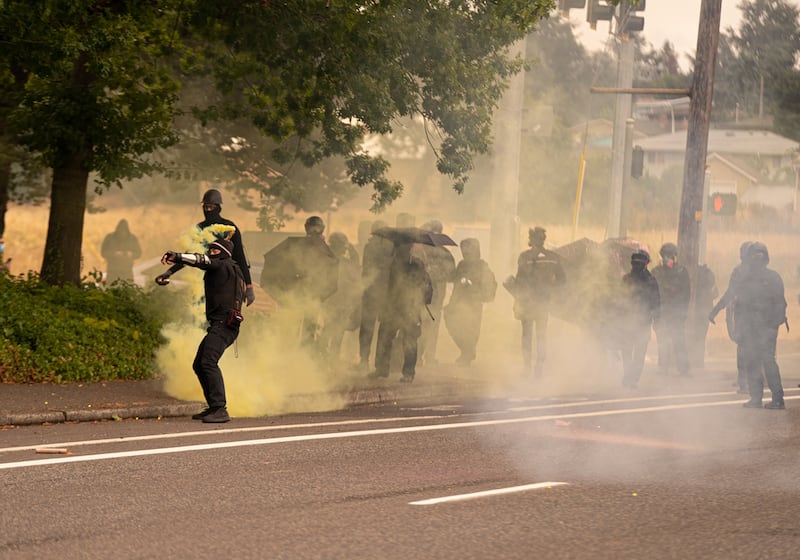
Zakir Khan, a Portland civil rights advocate, says police on Sunday abdicated their responsibility to protect minority communities.
“We learned lessons on Sunday that showed that East Portland and West Portland are treated like entirely different places, that one huge swath of the city will be disregarded and unprotected,” Khan says. “When you say you are not going to put a police presence in between groups that are going to fight each other—and especially between a Proud Boys group that has shown a propensity for hurting innocent bystanders before—you are saying that you are willing to accept collateral damage as a city. You can’t say ‘Black Lives Matter’ after that. You just can’t.”
The police response to such gatherings is significant, researchers say, because the threat of political violence has intensified.
Amy Herzfeld-Copple, deputy director of programs at Western States Center, which tracks extremism in the Pacific Northwest, says the risk of violence from Proud Boys, Patriot Prayer and similar extreme right-wing groups has increased since the failed insurrection at the U.S. Capitol.
“The turnout numbers didn’t increase post-Jan. 6, but you are seeing a consistent core of folks who represent perhaps the most willing to engage in political violence—the most ideologically devoted, which has real escalation risks,” Herzfeld-Copple says.
Blazak echoed that observation, saying that, in the post-Trump era, the Proud Boys are now less of a “coherent political movement but [rather] guys who are desperate to prove the legitimacy of their own fragile masculinity.”
The result? “It means violence,” Blazak says. “It means there are more street fights. It becomes pretty much an echo of the skinhead gangs that we saw [in the 1980s].”
Khan and Blazak agree: The safest approach is for police to keep opposing groups separate during such events. “That’s it,” Khan says. “It’s very simple.”
Workers at local businesses say they felt terrorized.
Employees at the Wendy’s directly across the street from the parking lot said they closed early Sunday after a protester sprayed mace into the restaurant. “It was kind of an emergency situation,” one worker told WW on Monday. The closure was unusually abrupt: Another worker recalled running up and down the drive-thru line on Sunday explaining to confused motorists that the Wendy’s had closed.
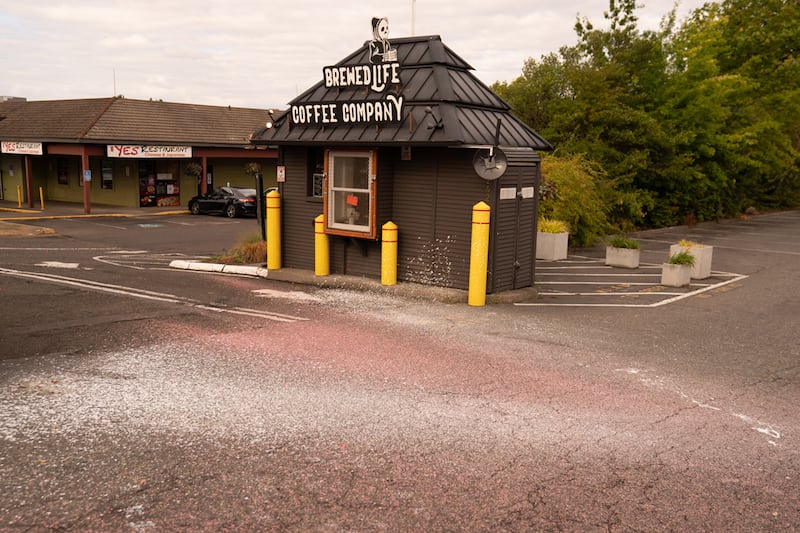
Kiley MC, a barista at the pocket-sized Brewed Life Coffee Company stand, told WW that someone had power-washed the pavement of the drive-thru lane Monday morning. White and red paint still speckled the ground by the afternoon. And more white paint, likely from a paintball gun, dotted the bottom right portion of the coffee stand’s façade.
“We got lucky,” Kiley says. “It could have been a lot worse.”
Like the Wendy’s and Chevron station, Yes Restaurant Chinese & Japanese also closed early Sunday because of the rally. One employee, who declined to share their name, described hearing what sounded like a gunshot close to 4 pm.
“We felt so scared. We closed all the open signs and doors and cleaned quickly and left,” the employee said.
The restaurant worker said Sunday nights—when they typically close at 9 pm—are usually busy, because many patrons are buying takeout for their families. All told, the employee estimates the restaurant lost $1,500 by closing early Sunday.
The employee added a refrain echoed by others working along 122nd Avenue: “We didn’t see any police.”
